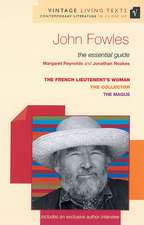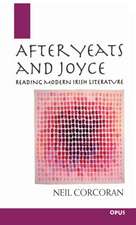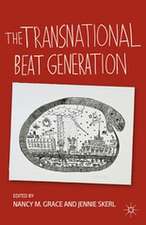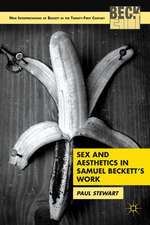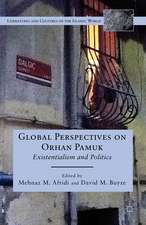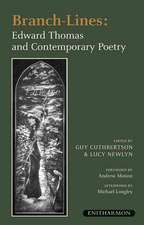Same-Sex Desire in Indian Culture: Representations in Literature and Film, 1970-2015
Autor Oliver Rossen Limba Engleză Paperback – 29 ian 2016
| Toate formatele și edițiile | Preț | Express |
|---|---|---|
| Paperback (1) | 381.43 lei 6-8 săpt. | |
| Palgrave Macmillan US – 29 ian 2016 | 381.43 lei 6-8 săpt. | |
| Hardback (1) | 387.58 lei 6-8 săpt. | |
| Palgrave Macmillan US – 5 ian 2016 | 387.58 lei 6-8 săpt. |
Preț: 381.43 lei
Nou
Puncte Express: 572
Preț estimativ în valută:
72.99€ • 76.36$ • 60.63£
72.99€ • 76.36$ • 60.63£
Carte tipărită la comandă
Livrare economică 02-16 aprilie
Preluare comenzi: 021 569.72.76
Specificații
ISBN-13: 9781349571918
ISBN-10: 1349571911
Pagini: 205
Ilustrații: XI, 205 p.
Dimensiuni: 140 x 216 mm
Greutate: 0.26 kg
Ediția:1st ed. 2016
Editura: Palgrave Macmillan US
Colecția Palgrave Macmillan
Locul publicării:New York, United States
ISBN-10: 1349571911
Pagini: 205
Ilustrații: XI, 205 p.
Dimensiuni: 140 x 216 mm
Greutate: 0.26 kg
Ediția:1st ed. 2016
Editura: Palgrave Macmillan US
Colecția Palgrave Macmillan
Locul publicării:New York, United States
Cuprins
Introduction
1. Contradictions or Syncretism? The Politics of Female-Female Desire in Deepa Mehta's Fire and Ligy J. Pullappally's Sancharram (The Journey)
2. "Am I Lesbian?" The Contexts of Female-Female Desire in the Work of Kamala Das
3. "The Bliss I Could Portray": Elliptical and Declamatory Male-Male Desire in the Work of Vikram Seth
4. Communal Tensions: Homosexuality in Raj Rao's The Boyfriend and Neel Mukherjee's A Life Apart
5. Transitional Mediations: Homosexuality in My Brother Nikhil, 68 Pages, and Quest/Thaang
Conclusion
1. Contradictions or Syncretism? The Politics of Female-Female Desire in Deepa Mehta's Fire and Ligy J. Pullappally's Sancharram (The Journey)
2. "Am I Lesbian?" The Contexts of Female-Female Desire in the Work of Kamala Das
3. "The Bliss I Could Portray": Elliptical and Declamatory Male-Male Desire in the Work of Vikram Seth
4. Communal Tensions: Homosexuality in Raj Rao's The Boyfriend and Neel Mukherjee's A Life Apart
5. Transitional Mediations: Homosexuality in My Brother Nikhil, 68 Pages, and Quest/Thaang
Conclusion
Recenzii
"Oliver Ross brings fresh insight to the debates and texts he examines and undertakes some excellent exegeses of much-analyzed, as well as under-analysed texts. He bravely takes on the current received wisdom that gay identity is 'irremediably Eurocentric'; as he points out, practitioners of queer theory who propound this view exempt queer theory itself from Eurocentricity in a largely unexamined way." - Ruth Vanita, Professor of Liberal Studies, University of Montana, USA and co-editor of Same-Sex Love in India: Readings from Literature and History
Notă biografică
Oliver Ross is a Teaching Fellow of English at the University of Cambridge, UK.
Textul de pe ultima copertă
This book explores representations of same-sex desire in Indian literature and film from the 1970s to the present. Through a detailed analysis of poetry and prose by authors like Vikram Seth, Kamala Das, and Neel Mukherjee, and films from Bollywood and beyond, including Onir's My Brother Nikhil and Deepa Mehta's Fire, Oliver Ross argues that an initially Euro-American "homosexuality" with its connotations of an essential psychosexual orientation, is reinvented as it overlaps with different elements of Indian culture. Dismantling the popular belief that vocal gay and lesbian politics exist in contradistinction to a sexually "conservative" India, this book locates numerous alternative practices and identities of same-sex desire in Indian history and modernity. Indeed, many of these survived British colonialism, with its importation of ideas of sexual pathology and perversity, in changed or codified forms, and they are often inflected by gay and lesbian identities in thepresent. In this account, Oliver Ross challenges the preconception that, in the contemporary world, a grand narrative of sexuality circulates globally and erases all pre-existing narratives and embodiments of sexual desire.

